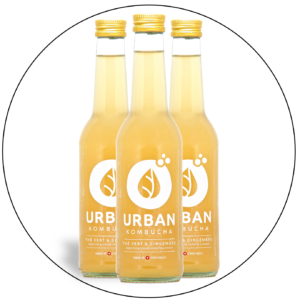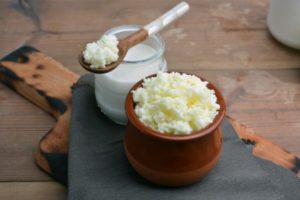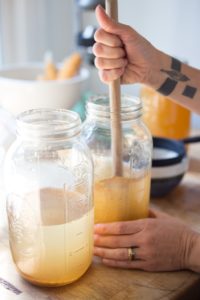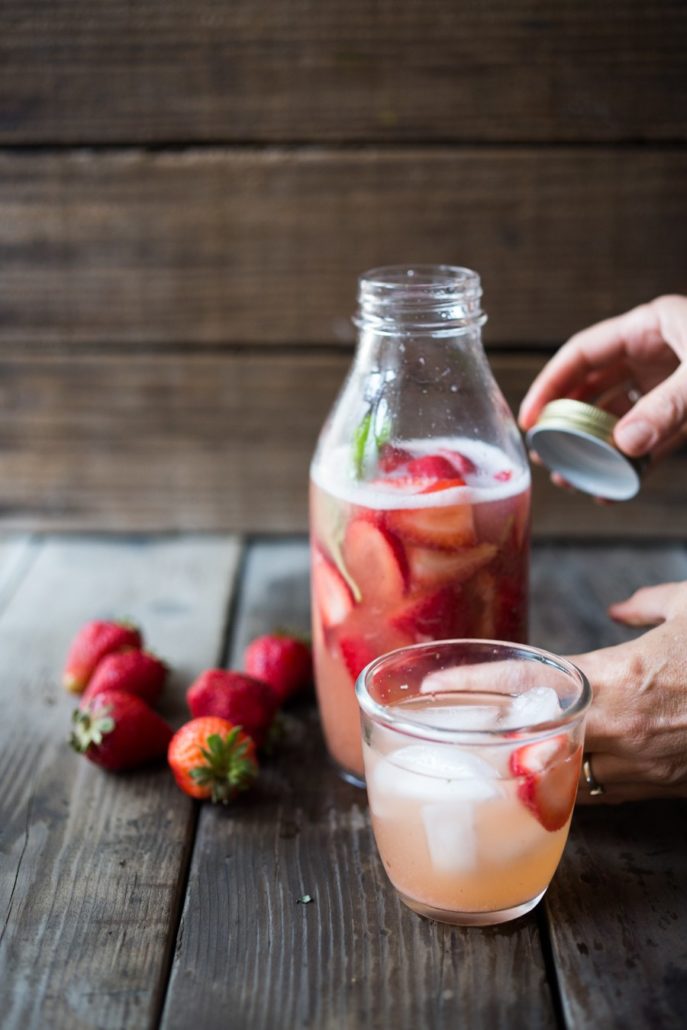Kefir (it means “good feeling!”)
by Sabrina – Monday, 2. October 2017
Kefir
Perhaps you’ve heard of the growing popularity of Kombucha, a bacteria-rich fermented tea that can be found online and in common Swiss grocery stores to aid digestion. But if you thought to yourself “what in the world is Kefir?”, then you’re at the right place.
Although kefir and kombucha both contain healthful microbes, kefir is a richer source of lactic acid bacteria. So you could think of kefir as a drinkable probiotic supplement, and kombucha as more of a digestive aid. Another big difference is that kombucha typically has caffeine, since it’s made from tea. However, water kefir contains a greater number of bacteria strains than those found in kombucha. Here, Velocity tells you more about this powerful bacteria-producing grain.
Kefir’s name comes from Turkish ‘keif’ meaning ‘good feeling’. As a product Kefir is becoming increasingly popular (again) as a result of new research into its health benefits. Originating in the Caucasus Mountains, kefir was prepared by culturing liquids with kefir grains in animal skin bags. These bags would be hung near a doorway so that bacteria in the bag would be mixed as people pass through. Historically, kefir grains were considered to be precious gifts; a source of family wealth that were passed down from generation to generation among the tribes of Caucasus.
Just over a hundred years ago, Elie Metchnikoff, Nobel Peace prize holder and “father of natural immunity”, theorised that the lactic acid bacteria found in fermented dairy was responsible for the exceptional health and longevity amongst Caucasian and Bulgarian populations. Kefir grains are yellow-white granules and look like mini cauliflowers. These grains contain mostly lactic acid bacteria and various yeasts. Kefir is produced by fermentation of lactic acid by these organisms.
All DISEASE STARTS IN THE GUT “HIPPOCRATES”
The intestinal bacteria, known as microbiome or microflora, helps our immune system and influences our general well-being. Dehydration, or a deficiency of prebiotics, plant foods, or enzymes on our plates, minimizes or destroys the balance of our microbiome. Not only does this effect our health but it also impedes our body’s ability to heal itself. In sum, our body’s bacteria are crucial to its health.
Certain bacteria in our bodies are present at all times, while others are transient depending on diet and environmental exposure. Key mechanisms that impact our resident bacterial population are as follows:
- Transient bacteria stimulate growth of resident bacteria by rapidly metabolising simple carbohydrates
- Cross-feeding with resident commensal bacteria can lead to the production of butyrate. A decrease in butyrate is associated with impaired health including IBS and IBD as well as metabolic diseases such as type 2 diabetes
- Production of growth factors, including vitamins
- Modification of bacterial composition in the gut changing the fitness of its microbial inhabitants and reducing pathogenic strains
- Reduce the toxic effects of heavy metals
- Increase activity of natural killer cells on virus and mutated cells
- Intolerance to foods can be improved with the breakdown of dietary starches and cellulose found in plant foods
- Both core and transient bacteria increase faecal mass and improve bowel function by removing waste
With age our microbiome becomes more vulnerable. If less efficient our immune system might loose more environmental and pathogenic challenges. Kefir offers a good and simple way to top up with good bacteria. It’s easy to make once you order your Kefir grains and get some simple equipment.
Equipment needed:
- Strainer (do not use metal which kills the microorganisms)
- Wooden Spoon
- 1 large glass jar with lid
- Bottles for storage
Ingredients:
- 1 sachet of water kefir grains
- 3 tablespoons of organic raisins or other un-sulphured dried fruit
- 70g sugar (don’t worry, this is not for you but the bacteria)
- ½ Organic lemon
- 1 slice of fresh ginger
- 1 litre of clean water
Method
- Dissolve sugar into water. You can use maple syrup but not honey due to its antimicrobial effect.
- Add kefir grains, raisins or dried fruit, lemon, ginger
- Allow water mixture to brew in a covered jar at room temperature for approx. 2-3 days depending on the strength you prefer and the exposed temperature (the warmer, the faster kefir will brew)
- Strain the water and bottle into smaller containers/bottles
- Allow smaller containers/bottles to stand for another 24-48h to continue fermentation
Mix with your favourite fruit as desired.
References:
http://www.culturesforhealth.com/water-kefir-grains-composition-bacteria-yeast
http://journal.frontiersin.org/article/10.3389/fpubh.2013.00052/full






December 2018 Best of Velocity Playlist
/in Health, Lifestyle, Rides/by VC Wordpress5 Gründe wieder mehr zu Gehen
/in Health, Lifestyle, Living in Zurich/by VC WordpressEffektives Training für unterwegs
/in Health, Lifestyle, Rides/by VC Wordpress